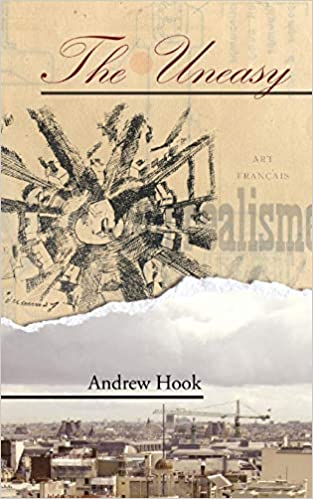 By ANDREW HOOK (Eibonvale Press; 2019)
By ANDREW HOOK (Eibonvale Press; 2019)
A surreal novella of a type that only England’s Eibonvale Press seems equipped to turn out. Readers of previous Eibonvale titles like SYLOW, TALLEST STORIES and SONGS FOR THE LOST probably won’t be put off by THE UNEASY’S unashamedly strange and uncommercial gist (as for everybody else I’m not so sure).
True surrealism is difficult to classify. The only person properly quipped do so, it seems, was the late Andre Breton (as this novel makes clear in the sentence “Frida Kahlo said she never knew she was a surrealist until Andre Breton came to Mexico and told her she was”). Hence there’s no way to properly measure how well author Andrew Hook has captured the surreal vibe he was evidently after, but he has created something wondrous, erotic and deeply confounding.
It follows the increasingly hallucinatory exploits of Imogen, a British perfumer who moves to Paris. She arrives expecting it to live up to its reputation as the city of romance, but finds that Paris’s other major attribute, as the birthplace of surrealism, is more appropriate to her experience. Very much an outsider in this city, Imogen desires a lover, but has very precise specifications: “a man as shadowy as he were dark, a doppelganger lover, who would cling in adulation and respect but who would not exist without her allowance of existence.”
Sex is the driving force of THE UNEASY. It’s not lost on Imogen (or the author) that perfume, the bane of her professional existence, has distinctly sexual properties “intended to drive the male libido skywards.” Her minutely described dreams and reveries are quite carnal in nature, involving bird mask wearing men whose “penises swirled like guy ropes in a sea breeze.” The world around Imogen, and the language describing it, begins to increasingly resemble the texture and logic of those fantasies, with tattoos dropping from people’s flesh and a seductive man entering her sphere. The man, who identifies himself as Francois, turns out to be quite knowledgeable about all things surrealistic, thus bridging the gap between the romantic and surreal sides of Paris, and quenching Imogen’s yearnings in the process.
The book is titled THE UNEASY for a reason. The eroticism here is of the bizarre and aberrant variety, with a climactic coupling that involves references to the city’s gargoyles and a “gradual suicide into a faction of normalcy.” Once again: precisely how surreal this book may truly be is an open question, but I strongly believe that Breton and his cohorts, who were partial to darkness and unreality, would have approved.
